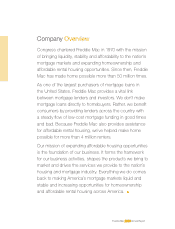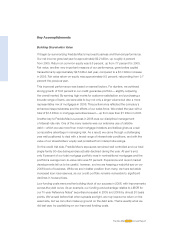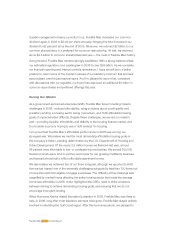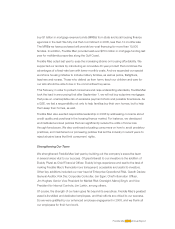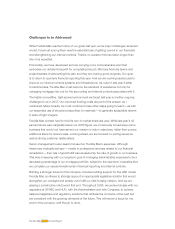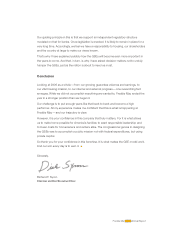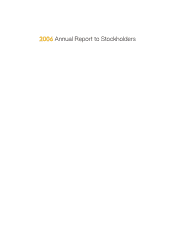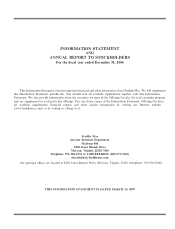Freddie Mac 2006 Annual Report Download - page 13
Download and view the complete annual report
Please find page 13 of the 2006 Freddie Mac annual report below. You can navigate through the pages in the report by either clicking on the pages listed below, or by using the keyword search tool below to find specific information within the annual report.This Information Statement and Annual Report includes forward-looking statements, which may include expectations
and objectives for our operating results, Ñnancial condition, business, remediation of internal controls and trends and other
matters that could aÅect our business. You should not unduly rely on our forward-looking statements. Actual results might
diÅer signiÑcantly from our forecasts and expectations due to several factors that involve risks and uncertainties, including
those described in ""BUSINESS,'' ""RISK FACTORS,'' ""FORWARD-LOOKING STATEMENTS'' and ""MANAGE-
MENT'S DISCUSSION AND ANALYSIS OF FINANCIAL CONDITION AND RESULTS OF OPERATIONS,'' or
MD&A. These forward-looking statements are made as of the date of this Information Statement and we undertake no
obligation to update any forward-looking statement to reÖect events or circumstances after the date of this Information
Statement, or to reÖect the occurrence of unanticipated events.
BUSINESS
Overview
Freddie Mac is a stockholder-owned company chartered by Congress in 1970 to stabilize the nation's residential
mortgage markets and expand opportunities for homeownership and aÅordable rental housing. Our mission is to provide
liquidity, stability and aÅordability to the U.S. housing market. We fulÑll our mission by purchasing residential mortgages
and mortgage-related securities in the secondary mortgage market. We are one of the largest purchasers of mortgage loans
in the U.S. We purchase mortgages and bundle them into mortgage-related securities that can be sold to investors. We can
use the proceeds to purchase additional mortgages from primary market mortgage lenders, thus providing them with a
continuous Öow of funds. We also purchase mortgage loans and mortgage-related securities for our investments portfolio. We
Ñnance our purchases for our investments portfolio and manage associated interest-rate and other market risks primarily by
issuing a variety of debt instruments and entering into derivative contracts in the capital markets.
Though we are chartered by Congress, our business is funded completely with private capital. We are responsible for
making payments on our securities. Neither the U.S. government nor any other agency or instrumentality of the U.S.
government is obligated to fund our mortgage purchase or Ñnancing activities or to guarantee our securities and other
obligations.
Our Charter and Mission
The Federal Home Loan Mortgage Corporation Act, which we refer to as our charter, forms the framework for our
business activities, shapes the products we bring to market and drives the services we provide to the nation's residential
housing and mortgage industries. Our charter also determines the types of mortgage loans that we are permitted to purchase,
as described in ""Business Activities Ì Types of Mortgages We Purchase.''
Our mission is deÑned in our charter:
‚ to provide stability in the secondary market for residential mortgages;
‚ to respond appropriately to the private capital market;
‚ to provide ongoing assistance to the secondary market for residential mortgages (including activities relating to
mortgages on housing for low- and moderate-income families involving a reasonable economic return that may be less
than the return earned on other activities) by increasing the liquidity of mortgage investments and improving the
distribution of investment capital available for residential mortgage Ñnancing; and
‚ to promote access to mortgage credit throughout the U.S. (including central cities, rural areas and other underserved
areas) by increasing the liquidity of mortgage investments and improving the distribution of investment capital
available for residential mortgage Ñnancing.
To facilitate our mission, our charter provides us with special attributes including:
‚ exemption from the registration and reporting requirements of the Securities Act of 1933, or the Securities Act, and
the Securities Exchange Act of 1934, or the Exchange Act. We are, however, subject to the general antifraud
provisions of the federal securities laws and have committed to the voluntary registration of our common stock with
the Securities and Exchange Commission under the Exchange Act;
‚ favorable treatment of our securities under various investment laws and other regulations;
‚ discretionary authority of the Secretary of the Treasury to purchase up to $2.25 billion of our securities; and
‚ exemption from state and local taxes, except for taxes on real property that we own.
Our activities in the secondary mortgage market beneÑt consumers by providing lenders a steady Öow of low-cost
mortgage funding. This Öow of funds helps moderate cyclical swings in the housing market, equalizes the Öow of mortgage
funds regionally throughout the U.S. and makes mortgage funds available in a variety of economic conditions. In addition,
the supply of cash made available to lenders through this process reduces mortgage rates on loans within the dollar limits
1Freddie Mac


